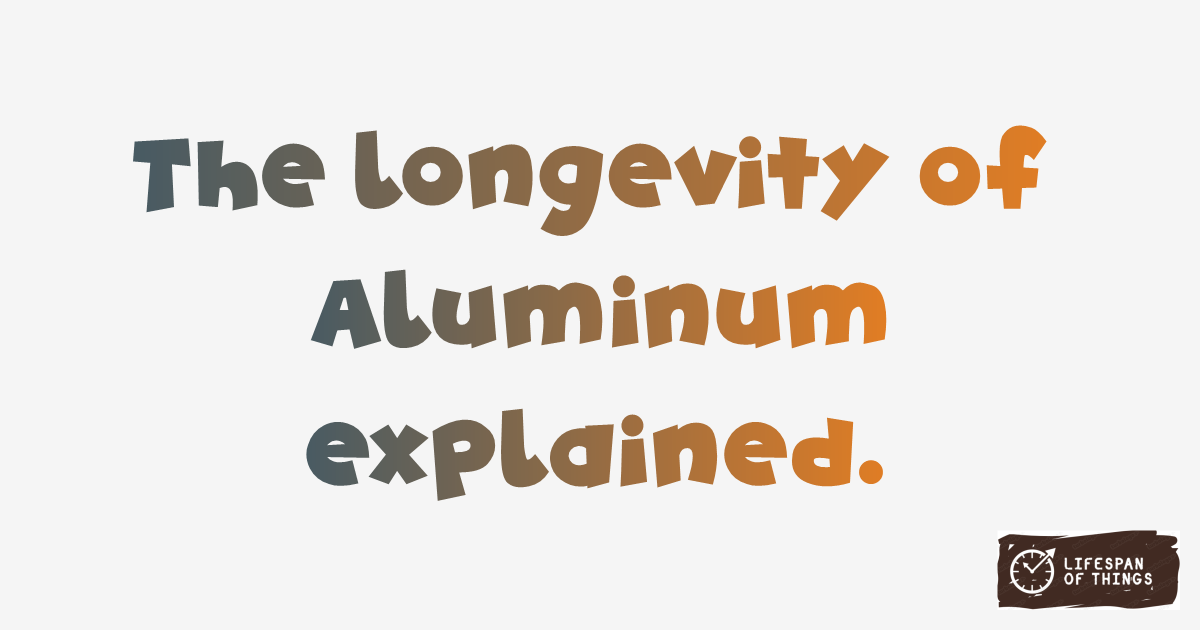
50 - 100 Years
Lifespan of Aluminum is 50 - 100 Years. Factors influencing the lifespan of Aluminum include exposure to moisture, temperature fluctuations, and corrosive environments. Regular maintenance, such as cleaning and protective coatings, can help extend Aluminum's lifespan.
Useful Information
Aluminum possesses excellent strength, flexibility, and conductivity due to its physical and chemical properties. Different types of Aluminum, like 6061 and 5052, offer varying levels of strength and corrosion resistance.
Explore the properties of non-ferrous metals, such as high strength, conductivity, and flexibility, and how they influence different types like aluminum, copper, and titanium.
Aluminum finds widespread use in construction, automotive, aerospace, and packaging industries. Its lightweight yet durable nature makes it a popular choice for structural elements, vehicle parts, and beverage cans.
The durability of Aluminum is influenced by exposure to moisture, high temperatures, and acidic environments. Factors like regular inspections, protective coatings, and proper storage can help enhance its lifespan.
The production and recycling of Aluminum can have significant environmental impacts. Choosing recycled Aluminum and implementing sustainable practices in its production can help mitigate these effects.
To maintain Aluminum, regularly clean it with a mild detergent and water. Avoid abrasive cleaners that can scratch its surface. Storing Aluminum in dry conditions can prevent corrosion and prolong its lifespan.
Lifespan Comparisons
| Compared Item | Comparison Description |
|---|---|
| Lifespan of Copper | Aluminum and Copper are both durable materials with a lifespan of approximately 50-100 years, ensuring longevity in various applications. |
| Lifespan of Zinc | Zinc, like Aluminum, can last 50-100 years, making it a reliable choice for long-term projects and constructions. |
| Lifespan of Tin | Tin, similar to Aluminum, offers a lifespan of 50-100 years, providing lasting quality in different uses. |
| Lifespan of Lead | Lead, with a lifespan like Aluminum, maintains its integrity for 50-100 years, making it a sturdy choice for certain applications. |
| Lifespan of Cotton | While Cotton has a shorter lifespan compared to Aluminum, it remains a popular choice for its comfort and breathability. |
| Lifespan of Wool | Wool, lasting longer than some materials like Cotton, offers durability and warmth for various textile applications. |
| Lifespan of Silk | Silk, with a lifespan similar to Wool, adds a touch of luxury and elegance to products compared to other materials. |
| Lifespan of Linen | Linen falls within the range of lifespan like Silk, providing a natural and lightweight choice for textiles and clothing. |
| Lifespan of Canola Oil | Canola Oil, with a shorter lifespan compared to Aluminum, is a versatile cooking oil known for its neutral flavor and high smoke point. |
| Lifespan of Balsamic Vinegar | Balsamic Vinegar, like Canola Oil, has a shorter lifespan than Aluminum but offers a rich and flavorful addition to culinary dishes. |
| Lifespan of Apple Cider Vinegar | Apple Cider Vinegar, with a lifespan similar to Balsamic Vinegar, is known for its potential health benefits and versatile uses in cooking and cleaning. |
| Lifespan of Nike Air Zoom Pegasus | Nike Air Zoom Pegasus, lasting as long as Aluminum, delivers superior cushioning and support for athletic performance and everyday wear. |
| Lifespan of Adidas Ultraboost | Adidas Ultraboost, with a lifespan comparable to Aluminum, offers energy return and adaptive comfort for active individuals and athletes. |
| Lifespan of Asics Gel-Kayano | Asics Gel-Kayano, lasting as long as Aluminum, provides stability and comfort for runners and fitness enthusiasts seeking reliable footwear. |
| Lifespan of Brooks Ghost | Brooks Ghost, similar to Aluminum in lifespan, offers responsive cushioning and support for runners looking for a smooth and comfortable ride. |
Frequently Asked Questions
Lifespan of Aluminum is 50 - 100 Years.
Aluminum comes in various types like 6061 and 5052, each offering unique strengths and corrosion resistance.
Aluminum is a favored material in construction, automotive, aerospace, and packaging industries due to its lightweight and durable nature.
Moisture exposure can impact Aluminum's lifespan, making regular inspections and protective coatings essential.
Choose recycled Aluminum and adopt sustainable practices to reduce the environmental impact of its production and recycling.
Regularly clean Aluminum with a mild detergent, avoid abrasive cleaners, and store it in dry conditions to prevent corrosion.








